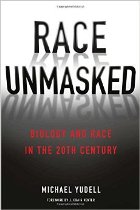Race Unmasked: Biology and Race in the 20th Century
 Michael Yudell
Michael Yudell
Columbia University Press, £27.50
Leading geneticists such as Craig Venter, who supplies the foreword, are fairly dismissive of the concept of human races. There can sometimes be more genetic diversity within a racial group than between races, yet race remains a feature of our world, sometimes disturbingly in its political application.
Yudell charts the evolution of the scientific concept of race, with a particular focus on its history in the US. Following Darwin, race and racism were partially underpinned by colonialism and the eugenics movement that sought to politicise discrimination. From the 1930s, the new evolutionary synthesis movement, represented by Theodosius Dobzhansky among others, sought to marginalise scientific racism with increasing momentum after the Holocaust.
The United Nations attempted to define race, although debate remained. Some advocated the elimination of race as a concept, whereas others thought it useful, to be further explored through DNA. This thinking leads to the present day when tailor-made genetic treatments may well shift focus back to racial attributes. There is much scholarly exploration – the architects who built up and then took apart the human race idea now tend to replace it with 'ethnic group'.
Although the arc of diminishing discrimination in scientific racism is mapped and highlighted with interesting exceptions, there is little here about ethnic lineages and human evolutionary topology itself. This is a critique of historical thinking, particularly in the context of American civil rights in the sometimes harsh light of a modern egalitarian consensus. By the end, race remains somewhat mysterious yet stubbornly present, within thankfully a more equal context.


